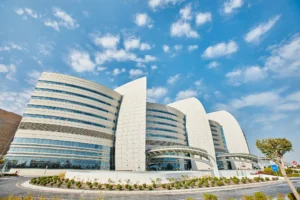While public hospitals have focused on dealing with the critical impact of COVID-19, the private hospital sector in the UK has been co-opted to provide beds for a potential NHS overflow. Hidden and acute healthcare effects across the population due to the pandemic are coming to the fore, which will profoundly impact private health care in the UK.
The UK private hospital sector typically targets more lucrative areas of healthcare, such as elective surgery for lower complexity procedures and relies heavily on stable and high cashflows. Organisational factors that affect financial stability in crises include their care portfolio, size and whether they are equity owned. Whereas the larger hospital groups are more resilient to crises pressures, a long term contraction in private patient demand is likely to sting cash flows.
A historic NHS and private healthcare sector partnership
A fourteen-week historic arrangement was made between the NHS and the private healthcare sector, in which the government pays all operating costs, including rent, staff and external interest payments in return for making 80,000 beds, 1,200 ventilators, 10,000 nurses and 700 doctors available for COVID-19 patients.
NHS funding comes from general taxation; however, patients whose employers provide private medical insurance will often opt to beat long waiting lists by paying for private healthcare. According to the Financial Times, about 40% of private-sector patients pay for care via private medical insurance.
The NHS pays a further 30% through the ‘choose and book system’ to help alleviate long waiting lists. In some areas, specific surgeries are outsourced to the private sector at the NHS’s expense. With only 2.5 beds and 2.8 medical practitioners per 1,000 people (far lower than comparable health systems), waiting lists have significantly exceeded the NHS stated targets, spurred by an ageing and vulnerable population. COVID-19 has exacerbated this situation.
However, during the lock down period, hundreds of private beds remained empty, as the expected surge overflow did not materialise. Many patients that would have used healthcare facilities opted to postpone or not seek treatment to avoid getting infected in the hospital setting, and most elective surgeries, appointments and treatments were cancelled.
Compounded patient backlog amidst significant health and social care system pressures
Data emerging as the pandemic rages shows ‘unexplained’ general deaths rising and critical diagnoses of conditions such as cancer and heart disease rapidly declining, as well as long-term damage to several organs due to COVID-19. Family violence, suicides and alcohol-related violence have increased drastically, and a surge in mental health problems related to lockdown is occurring, exacerbated by the expected long-term economic recession. All of these will have a profound effect on the health system going forward.
Continued co-operation between the NHS and the private sector may become an absolute necessity, but can the private sector survive operating at cost only payments? Changes in volume and case mix will impact margins, and many private hospital operators could be facing cash flow crises if private patient demand does not return for some time.
UK private hospital groups are hoping to renew their current NHS contracts for a further two years, to help the NHS clear their now compounded backlog. The Department of Health and Social Care and the NHS are currently assessing their regional needs, and based on this assessment, they are considering a lesser agreement with the private sector, as the extension of the full agreement could cost the NHS between £100m and £125m a week.
Private hospitals restart elective procedures and await the return of medical tourism
Spire warned in early March that it was at risk of breaking banking covenants and suspended its dividends. However, it managed to secure a covenant waiver on a £425m senior facility for its next two tests at the end of June and December, as reported by the Financial Times.
Ramsey relies on the NHS for about 80% of its revenue, with BMI/Circle and Spire each receiving approximately 30% of their income from the NHS. The deal with the NHS, assessed by KPMG, brought interim relief to private hospitals but left consultants, private practitioners, physiotherapists and private patients “thrown to the wind” according to Ian McDermott, a prominent knee surgeon and co-vice-chairman of the Federation of Independent Practitioner Organisations.
HCA Healthcare has suffered a 45% loss in profit amid COVID-19’s impact due to suspension of lucrative elective surgeries, closed clinics and reduced staff hours across America and the UK. CEO Sam Hazen said given the uncertainty around the pandemic they had to abruptly turn from their growth strategy to solidify their financial footing. Their stock plummeted 54% from mid-February to mid-March. Hazen donated a percentage of his salary to assist struggling staff.
At the end of May, private hospitals were granted permission to restart certain elective surgeries and cancer treatments with prior approval; however, not all beds have been unblocked. Travel bans have already dealt a massive blow to the private sector’s medical tourism revenues, with travel corridors yet to be established with lucrative international private patient markets such as the Middle East and China.
London is a major medical tourism hub, and private hospital operators will be watching these developments closely, including upcoming London hospital projects such as the Cleveland Clinic London, who are expected to open their 185 inpatient bed facility in 2021.















